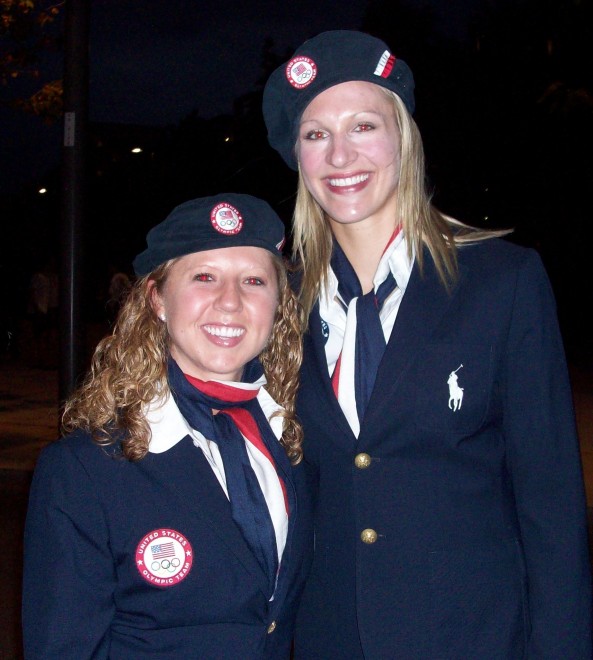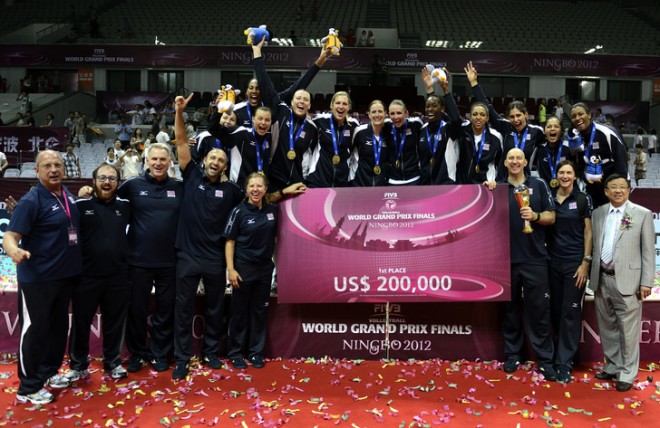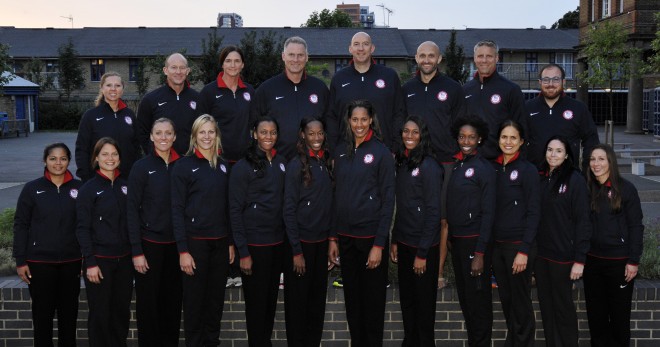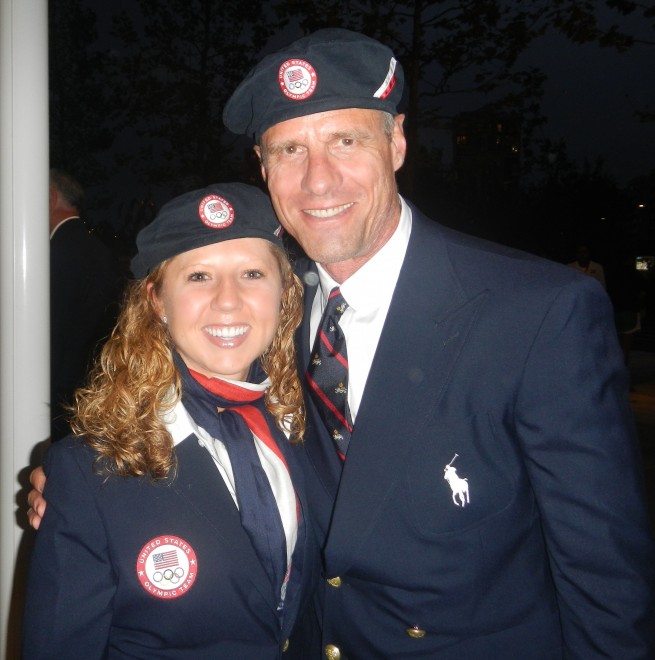The walk from London’s Olympic Village to the Olympic Stadium should only have taken 15 or 20 minutes. But when Jill Wosmek ’03 took that short mile-and-a-half journey on the evening of July 27, 2012, it took four hours.
“It was shuffle-step-stop, shuffle-step-stop the whole way there,” Wosmek remembers.
It only took Wosmek, the head athletic trainer for the U.S. Women’s National Volleyball team, and the rest of Team USA about four minutes to take a lap around the stadium as part of the Opening Ceremonies of the Summer Olympic Games. But they were four very memorable minutes.
“The stadium just exploded when we walked in,” she says. “There was so much noise. It was quite an experience for me. You meet a lot of people and take a lot of photos. ”

Jill Wosmek (left) with Christa Harmotto, the starting middle for the USA Women’s Volleyball team at the Opening Ceremonies for the 2012 Summer Games in London.
Athletic trainers and other staff aren’t often included in the Opening Ceremonies, where athletes from each country parade through the stadium. But before the London games, a lottery was held to include one delegate per team, and Wosmek was chosen to represent the women’s volleyball team. “It was cool to experience it with the team, to experience how big it really is, to meet athletes from so many countries,” she says. “I don’t think I’ll ever have an experience like that again.”
Whether she participates in the Opening Ceremonies again or not, Wosmek is already preparing for her next Olympic experience. After the U.S. Women’s Volleyball team won silver in London, assistant coach Karch Kiraly was named as the head coach of the team; Kiraly asked Wosmek to stay on as the head athletic trainer for the next four years. She will be with the team in Rio de Janeiro, Brazil, in 2016.
“I already have so many ideas about how to do it better and what we’ll do differently,” she says. “That’s where we’re at right now: planning, strategizing, making a plan for the next four years. Hopefully, all of that will be able to bring a different result and we’ll get a gold medal.
“Silver is great, but what we’re really after is gold.”
Up to the Challenge
Wosmek’s road to the London Olympics began on the day she took a tour of Minnesota State Mankato as a high school senior. While she was on campus, she attended a presentation about athletic training that intrigued her, so she went home to Silver Lake, Minn., and talked to the athletic trainer at her high school. “She convinced me,” Wosmek remembers. “I decided that’s what I wanted to do. It was a good fit for me.”
She knew from the beginning that it wouldn’t be an easy major; of the 170 people in her freshman class who identified an interest in athletic training, fewer than 40 actually applied to the program—and only 16 were accepted. “It was extremely challenging to complete the program,” Wosmek admits.
As challenging as it was, however, Wosmek recognizes that the rigorous reputation of Minnesota State Mankato’s Athletic Training program helped open doors for her professionally.
“In the athletic training field, Mankato is one of the names that people know,” she says. “The program is highly respected across the country; if you name drop Mankato when you’re talking about athletic training, then it’s like you’re at a whole different level.”
After graduating from Minnesota State Mankato in 2003, Wosmek received her master’s degree at the University of Minnesota, where she worked under fellow Minnesota State Mankato graduate Amy Hamilton. That led to a job as an assistant athletic trainer at the University of South Carolina–Aiken and then to a position at Penn State, where she served as the athletic trainer for the men’s and women’s volleyball teams.
Although she loved working with college athletes, after two years at Penn State Wosmek began thinking about her next career move. “I realized that it was like I was still in college,” she says. “You work a lot—probably 70 hours a week. I had to find a progression, a way to think bigger and better.”

Wosmek and the team celebrate after winning the Grand Prix, a well known women’s international event, in August.
For a female athletic trainer, the opportunities in professional sports are limited by the relative scarcity of professional teams. So to work with elite athletes, Wosmek started looking into Olympic sports. Her experience with the volleyball teams at Penn State provided a natural connection to USA Volleyball, and she was hired in May 2009 to work with the women’s team as they prepared for the 2012 Olympics.
“It was a good fit for me,” she says. “It was both challenging and fun at the same time. And because you get so much international experience, it really opens up what you know about sport medicine. You see what the world is doing, how they are working worldwide. That’s really intriguing to me. The challenge in this job is how to be the best in the world.”
Multifaceted Field
The athletes Wosmek works with now are in fact among the best in the world. But that doesn’t mean that she treats them any differently than she would any other athlete. “The pressure for the athletes is certainly different,” she says. “But for me, and for any health care provider, the pressure is the same: to do the best you can do for each athlete.”
She credits Minnesota State Mankato for preparing her to work with athletes in a number of different settings and exposing her to many of the different elements of the field. But she is still surprised to find that there are many facets of her job that she had no idea she would be handling, from securing sponsors for nutritional bars for the athletes to working with the city of Anaheim, where the volleyball teams train, to ensure that all the necessary services are provided.
“It’s such a multifaceted, diverse field,” Wosmek says. “Many people don’t know what an athletic trainer is; they think you’re a glorified water person who can tape an ankle. But in reality, we have to have the same skills as a physical therapist to help athletes recover from injuries. We have to have the same triage skills as an ER nurse to assess acute injuries. We need to be a sports nutritionist, a strength and conditioning coach, even a sports psychologist at times.”
Wosmek was all of those things during the 2012 Summer Games in London. The team played every other day for the duration of the games—a grueling schedule that required everyone to stay focused on the competition. “This team has a very business-like approach,” she says. “Everyone takes it pretty seriously; they know that it’s their job. We all know that once you put your volleyball shoes on, then you’re at work.”
Wosmek has her work cut out for her over the next four years. Preparing for the Olympics involves long hours and lots of travel—often overseas. Although that schedule can be draining, Wosmek remains excited about it. “This is my dream job right now,” she says. “As for what I’ll do next, I’m open. I’m sure something else will come up.”
Patrick Sexton, the director of the athletic training program at Minnesota State University, is sure of that as well. He remembers Wosmek as a strong student with a great attitude and a lot of determination. “She always knew what she wanted to do,” he says. “This whole experience will help her—from the people she’s met to the reputation she’s built with the team. Getting to the gold medal round at London will help her, whatever she does next.”


Speak Your Mind